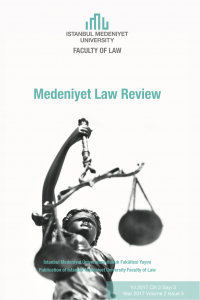Öz
Kaynakça
- Baumann, G., 1999. The multicultural riddle: Rethinking national, ethnic, and religious identities. Psychology Press.
- Brian Z. Tamanaha, 2004, On the Rule of Law, History, Politics, Theory (Cambridge: Cambridge University Press).
- Carl Schmitt, Political Theology. Four Chapters on the Concept of Sovereignty, [1922], Trans. G Schwab (University of Chicago Press, Chicago, IL 2005).
- Chris Thornhill, 2011, A Sociology of Constitutions: Constitutions and State Legitimacy in Historical-Sociological Perspective (Cambridge University Press). Diamantides, Marinos (2015) Constitutional theory and its limits - reflections on comparative political theologies, Jr. Law, Culture and the Humanities 11 (1).
- John Rawls. A Theory of Justice, Cambridge, Mass: The Belknap Press of Harvard University Press; 1971.
- Kamal, J., 2007. Justified interference with religious freedom:the European Court of Human Rights and the need for mediating doctrine under Article 9 (2). Colum. J. Transnat'l L., 46.
- Kukathas, C. and Pettit, P., 1990. Rawls: a theory of justice and its critics. Stanford University Press.
- Kymlicka, W., 1995. Multicultural citizenship: A liberal theory of minority rights. Clarendon Press.
- Laycock, D. and Thomas, O.S., 1994. Interpreting the Religious Freedom Restoration Act. Tex. L. Rev.
- Loughlin, Martin Foundations of Public Law (Oxford: Oxford University Press, 2010), chapter 10, The Constitutional Contract.
- R. C. Van Caenegem, 1995, An Historical Introduction to Western Constitutional Law (Cambridge: Cambridge University Press).
- Rawls, J. (2001). Justice as Fairness: A Restatement.Cambridge: The Belknap Press of Harvard University Press.
- Ryan, B., 2011. Carl Schmitt: Zones of Exception and Appropriation. Kierkegaard’s Influence on Social-Political Thought (Kierkegaard Research: Sources, Reception, Resources, zv. 14). Farnham: Ashgate.
- S. Mancini ‘The Tempting of Europe, the Political Seduction of the Cross: A Schmittian Reading of Christianity and Islam in European Constitutionalism’ in Mancini & Rosenfeld (eds.) Constitutional Secularism in an Age of Religious Revival (Oxford UP, 2014).
- Sakaranaho, T., 2006. Religious freedom, multiculturalism, Islam: cross-reading Finland and Ireland. Leiden: Brill, pp. 51-60.
- Sullivan, W.F., 2005. The impossibility of religious freedom. Princeton University Press.
- Taylor, C., 1994. Multiculturalism, Princeton University Press.
Öz
Religious freedom is a very controversial issue in today’s world. Commenting on the religious freedom on the basis of the theories of Carl Schmitt and John Rawls, two of the most important philosophers
and legal theorists of the last century, may be a guide for us to discern the contemporary debates because these philosophers represent two different ideas. Schmitt is a strong criticism of liberalism, while Rawls is literally a liberal. Rawls contends that the ideas of flexibility and uniformity are not totally unrelated. His evaluation of the equity framework drives him to presume that for equity to be genuinely just,
everyone must be managed similar rights before the law. On the other hand, Schmitt argues that the sovereign has decided to make an exception. The condition of exemption is the monopolistic area of the
sovereign, while uncovering the sovereign itself. In any case, sway, as well, then, is likewise he who characterises what's "the typical." Who determines the limits of religious freedom? Where does the law come
from? Who is the sovereign? These questions are significant for understanding the constitutional theory and religious freedom. Firstly, this article will summarise their theories. Afterwards, will discuss the relationship between the freedom of religion and the constitutional system by these questions.
Anahtar Kelimeler
Religious Freedom Carl Schmitt John Rawls constitutional law sovereign
Kaynakça
- Baumann, G., 1999. The multicultural riddle: Rethinking national, ethnic, and religious identities. Psychology Press.
- Brian Z. Tamanaha, 2004, On the Rule of Law, History, Politics, Theory (Cambridge: Cambridge University Press).
- Carl Schmitt, Political Theology. Four Chapters on the Concept of Sovereignty, [1922], Trans. G Schwab (University of Chicago Press, Chicago, IL 2005).
- Chris Thornhill, 2011, A Sociology of Constitutions: Constitutions and State Legitimacy in Historical-Sociological Perspective (Cambridge University Press). Diamantides, Marinos (2015) Constitutional theory and its limits - reflections on comparative political theologies, Jr. Law, Culture and the Humanities 11 (1).
- John Rawls. A Theory of Justice, Cambridge, Mass: The Belknap Press of Harvard University Press; 1971.
- Kamal, J., 2007. Justified interference with religious freedom:the European Court of Human Rights and the need for mediating doctrine under Article 9 (2). Colum. J. Transnat'l L., 46.
- Kukathas, C. and Pettit, P., 1990. Rawls: a theory of justice and its critics. Stanford University Press.
- Kymlicka, W., 1995. Multicultural citizenship: A liberal theory of minority rights. Clarendon Press.
- Laycock, D. and Thomas, O.S., 1994. Interpreting the Religious Freedom Restoration Act. Tex. L. Rev.
- Loughlin, Martin Foundations of Public Law (Oxford: Oxford University Press, 2010), chapter 10, The Constitutional Contract.
- R. C. Van Caenegem, 1995, An Historical Introduction to Western Constitutional Law (Cambridge: Cambridge University Press).
- Rawls, J. (2001). Justice as Fairness: A Restatement.Cambridge: The Belknap Press of Harvard University Press.
- Ryan, B., 2011. Carl Schmitt: Zones of Exception and Appropriation. Kierkegaard’s Influence on Social-Political Thought (Kierkegaard Research: Sources, Reception, Resources, zv. 14). Farnham: Ashgate.
- S. Mancini ‘The Tempting of Europe, the Political Seduction of the Cross: A Schmittian Reading of Christianity and Islam in European Constitutionalism’ in Mancini & Rosenfeld (eds.) Constitutional Secularism in an Age of Religious Revival (Oxford UP, 2014).
- Sakaranaho, T., 2006. Religious freedom, multiculturalism, Islam: cross-reading Finland and Ireland. Leiden: Brill, pp. 51-60.
- Sullivan, W.F., 2005. The impossibility of religious freedom. Princeton University Press.
- Taylor, C., 1994. Multiculturalism, Princeton University Press.
Ayrıntılar
| Birincil Dil | İngilizce |
|---|---|
| Konular | Hukuk |
| Bölüm | C. 2. S. 3 Araştırma Makaleleri |
| Yazarlar | |
| Yayımlanma Tarihi | 31 Temmuz 2017 |
| Yayımlandığı Sayı | Yıl 2017 Cilt: 2 Sayı: 3 |


